Running a games company (into the ground) in Software, Inc.
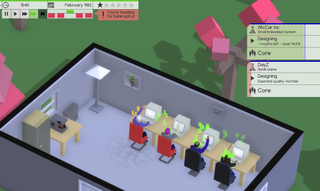
A game about making games
Ever dream of running your own game company? Opening an office, hiring a team, coding a game, missing its release date, shipping it with tons of bugs, marketing it poorly, and going bankrupt? Then I've got great news. Software Inc. is a sim/strategy game about doing just that—if you play it the way I did.
Perhaps ironically, Software Inc. is now in Early Access. Here's where I went wrong.
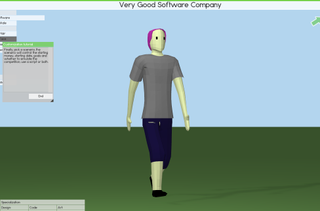
Lost and founder
Meet the imaginatively named Bob Software, founder of Very Good Software Company. I gave him pink hair for that artsy indie feel, but dressed him in jorts because he really has no clue what he's doing. I start him with $20K in cash, and use half of it to build an office. No coding in a Starbucks for Bob S!
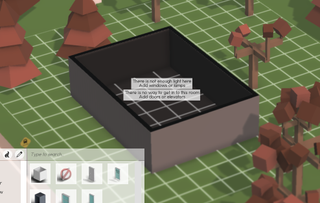
Cube farm
As in The Sims, you can build rooms and populate them with furniture and equipment. Right away, I can see that working with game developers is going to be a headache. They need things like "light" and "a way into and out of the building." What will they ask for next? Oxygen? Health insurance?
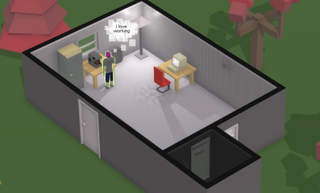
Setting your own hours
I start Bob out the way I imagine many game developers begin: working on assets for someone else's game, but also working on his own original project. Bob doesn't even bother showing up to work for the first month, and when he does he thinks about how much he loves it while on a coffee break. Off to a great start.
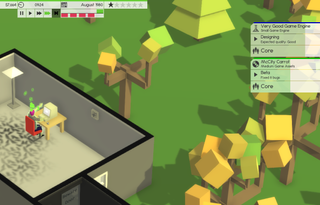
Human resources
Bob, in addition to tracking filth all over his office floor, is almost done with his game engine. He's also beta testing his contract work, which he finally releases a couple of months late, losing money in the process. I think we need to hire a development team if we're going to make this work. And a cleaning person.

Bob. BOB!
Can confirm. Have been self-employed.
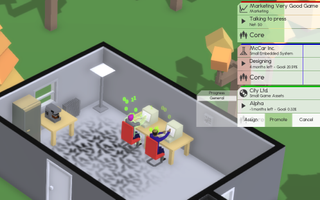
Staffing up
I hire Quincy, a programmer, to work on two contracts while I market my game. Being the cheapest hire I could find, he doesn't contribute much other than another set of dirty footprints on the carpet. Out of everyone in the game, I think the cleaning person is the only one making money.
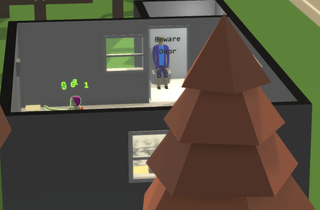
Transparency
Maybe I'm the problem. Maybe installing a glass door in the employee restroom, so I could make sure Quincy is actually using the toilet and not just playing Crossy Road in there, has not motivated him to work at peak efficiency. We'll never know because I can't afford to buy a new, proper door at this point. I'm broke.
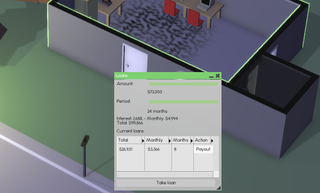
Phat bank
Thankfully, as in all sim games, there are loans. Loans are the best because they're essentially free money, no questions asked, and while I have to pay it back in two years, that means I don't need to think about it for one year and 11 months. Everything will be great in two years. I'm sure of it.
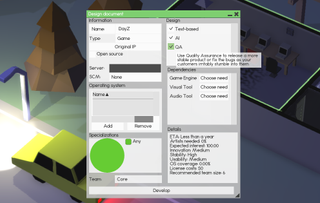
Walking simulator
Flush with cash, I add more desks and PCs, and hire an artist and another coder. In addition to new contract work I start on another game: DayZ! Why not? I don't think Software Inc. simulates Early Access, though, so my team will actually have to finish it before getting paid.
Zing.
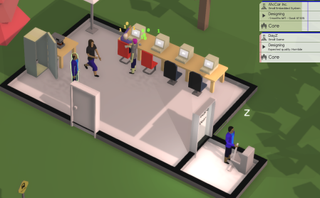
Silicon pallies
Soon my business is positively humming! Well, sort of. One person is working, two others are eating from the fridge, and someone is sleeping in the toilet. Startups, amirite? Seriously, this is not going well. My staff is incredibly expensive, we're months behind on everything, and the outlook on DayZ is not good.
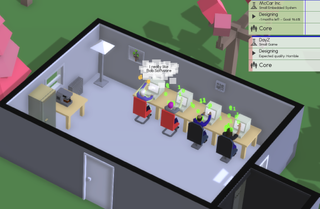
Improprieties
Eventually work actually does take place. After a complaint about the office being boring, I put a painting on the wall. See, I'm a good manager! Except for the glass door on the bathroom. Also, someone is thinking nice thoughts about Bob. Could it be that a little office romance might be in the works? The answer is on the next slide!
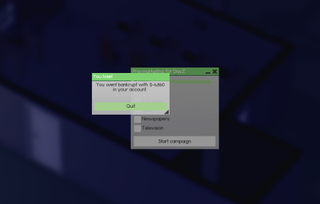
Nope.
Before Bob Software can improperly enter into a relationship with one of his employees, he goes bankrupt. DayZ was never released, which will no doubt be a relief to some, though definitely not to the bank I owe tens of thousands of dollars to.
This game about making games is a lot like making games. It's also a lot of fun. Here it is on Steam.

Chris started playing PC games in the 1980s, started writing about them in the early 2000s, and (finally) started getting paid to write about them in the late 2000s. Following a few years as a regular freelancer, PC Gamer hired him in 2014, probably so he'd stop emailing them asking for more work. Chris has a love-hate relationship with survival games and an unhealthy fascination with the inner lives of NPCs. He's also a fan of offbeat simulation games, mods, and ignoring storylines in RPGs so he can make up his own.
Most Popular


